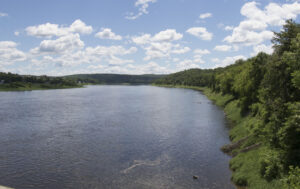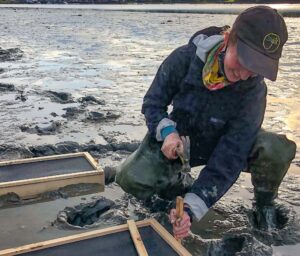Research teams focused on reusable packaging, engaging with tribal nations, and coastal stewardship receive Sustainability Grants
We’re excited to announce that six projects have been awarded Mitchell Center Sustainability Grants for fiscal year 2022. Three of the funded projects are highlighted below and the rest will be featured in an upcoming Mitchell Center news article.
Exploring the Potential for Reusable Take-out Packaging in Maine

Maine residents are generating more waste per capita over time, despite the state’s goals to reduce this number. Much of the waste stream is made up of single-use packaging, including food take-out containers. Reusable packaging models for restaurants are emerging across the United States and around the world and early research suggests that it can save restaurants money, build customer loyalty, and reduce negative environmental impacts. But very little is known about the costs and benefits of different models. In this project, the Mitchell Center’s Materials Management team, working with partners from the Maine hospitality industry, waste management sector, and Department of Environmental Protection, will test reusable packaging pilot programs with participating restaurants and municipalities to better understand how these systems might operate in Maine.
Strengthening Engagement with the Houlton Band of Maliseet Indians for Watershed Restoration and Environmental Justice

The Houlton Band of Maliseet Indians (HBMI) Natural Resources Department (NRD) works on water quality, conservation, and climate change throughout the Meduxnekeag and larger Wolastoq/St. John watersheds. Through use of the Story Map platform, the research team aims to raise awareness about the NRD’s work with multiple audiences including the tribal council of the HBMI, the larger HBMI community, and watershed communities that are connected to the Meduxnekeag River and its tributaries. A commitment to justice-oriented and decolonizing approaches to the production of knowledge, aligned with UMaine’s larger research values as they relate to work that intersects with Wabanaki Tribal Nations, is foundational to this work. The team, which includes Bridie McGreavy, Darren Ranco, UMaine Ph.D. student Michael Clay, and Sharri Venno of the NRD, aims to practice reciprocity within research along the lines Kim TallBear describes, not as just a practice of giving back but of standing with partners in ongoing processes of relationship-building and learning.
Building Knowledge and Capacity for Community-Led Coastal Stewardship

Coastal ecosystems and the human communities that depend on them are linked environmentally, economically and socially. Knowledge of these complex, dynamic connections is needed to sustain both ecological and human communities, yet fine-scale data relevant to specific places are often lacking. The University of Maine Darling Marine Center (DMC), in partnership with the Damariscotta-Newcastle Joint Shellfish Committee and Lincoln Academy, is developing a community science research program in the Damariscotta River estuary. The team, led by Heather Leslie and including UMaine master’s student Sarah Risley and Joshua Stoll, is working with local scientists, students, educators, harvesters, and municipal leaders to collect information on shellfish and document how the estuary is changing. The research will provide important information on the estuary’s ecology and the diversity of commercial and recreational activities on the river. It will also enable students to gain hands-on experience in data collection, interpretation and application.
Congratulations to all recipients of this round of Mitchell Center Sustainability Grants. Look for updates and stories on their work on our website, on Facebook, and in future e-newsletters.
